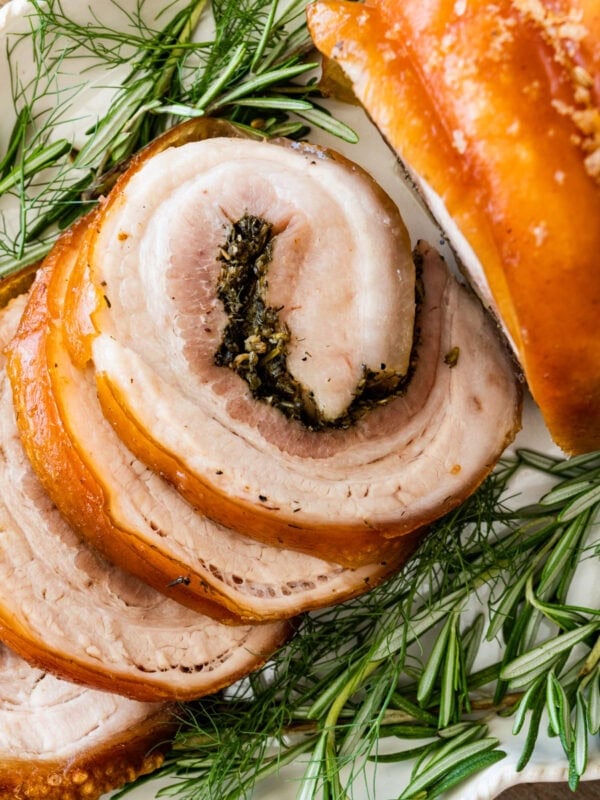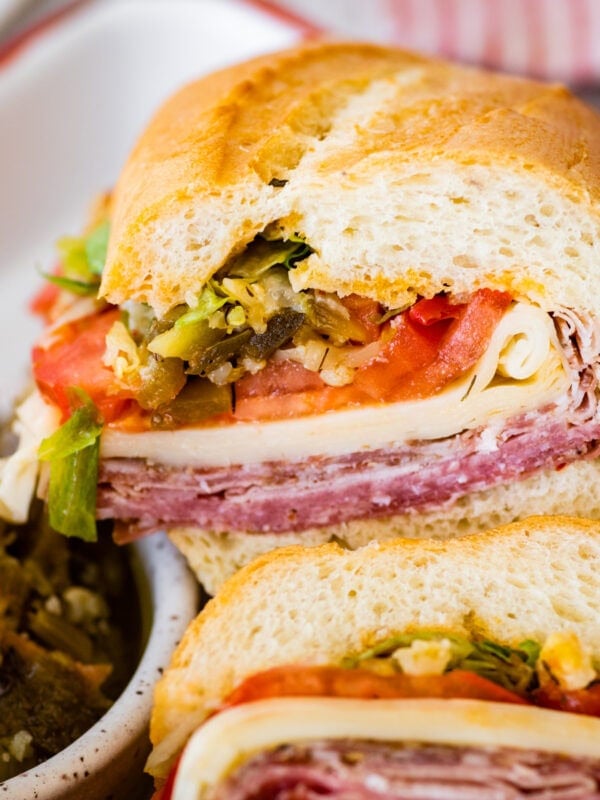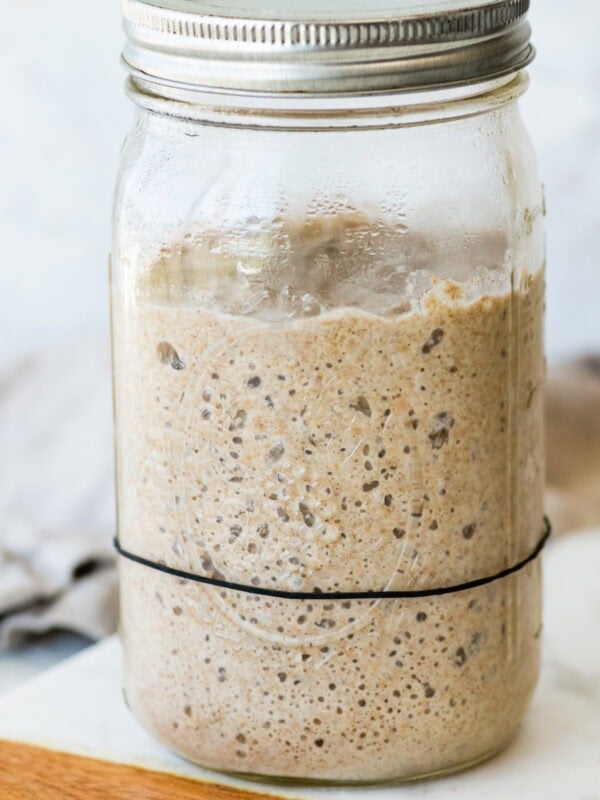This post may contain affiliate links. Please read our disclosure policy.
This hearty, Danish sourdough rye bread (Rugbrød) is intensely flavorful, loaded with wholesome grains, and incredibly simple to make (you won’t need to babysit it for two days just to get a loaf like traditional sourdough)! This no-knead, one-bowl bread has a slow ferment and a delicious bake. It’s the kind of bread that makes you feel good! My mom’s made it for over 20+ years; once you start, you won’t stop making it.
You will also love our no-knead crusty bread recipe. Try our Danish risalamande.

Why you’ll love this family favorite!

An Italian nonna making authentic Danish Rye Bread—who would’ve thought? But when my mamma married the Danish dad who raised me, she knew she had to learn the recipes that made him feel at home. Rugbrød (Danish rye bread) was one of them—a daily staple.
She tried to find it in stores, but nothing ever tasted like the real thing from the bakeries in Denmark. So, she rolled up her sleeves and started baking it herself. Over 20 years later, she still makes it weekly (sometimes multiple loaves!) and has taught many others how to do the same.
This bread is naturally fermented for better digestion and flavor, packed with wholesome grains and seeds, no-knead, no fuss—just time and love. It’s perfect for meal prep, freezes beautifully, and includes modern tips to help you get it right at home. Now, we’re so excited to share this special recipe with you!
Made With AmorE,

Table of Contents
Recipe Ingredients

- Active Sourdough Starter: The heart of this bread gives it rise, flavor, and that signature tang.
- Filtered Lukewarm Water: Helps activate the starter and hydrate the dough evenly.
- Maple Syrup: Adds a subtle touch of sweetness and encourages fermentation.
- Dark Rye Flour: The base flour is dense, rich, earthy, and full of fiber.
- Split Oats: Add hearty texture and help retain moisture in the loaf.
- Flaxseed Meal: Adds nuttiness and nutrients, while also helping to naturally bind the dough.
- Sunflower Seeds: Add crunch and a mild, roasted flavor to the bread.
- Pumpkin Seeds: Offer color, texture, and a slightly sweet, nutty bite.
- Sea Salt: Enhances flavor and balances the earthy and tangy notes.
See recipe card for full information on ingredients and quantities.
Substitutions and Variations
- Swap seeds: Use chia, sesame, or hemp seeds in place of sunflower or pumpkin.
- Flour variation: Replace up to 100 g of rye flour with whole wheat for a different texture.
- Add-ins: Try caraway seeds, fennel, or dried cranberries for a twist.
- Gluten sensitivity: Use 100% rye flour (naturally lower in gluten) and skip oats if needed.
How To Make Sourdough Rye Bread
This is a step-by-step photo overview of making sourdough rye bread from scratch; the full instructions are in the recipe card below. I highly recommend reading the rye sourdough starter recipe before making the bread.

Step #1: After dividing the sourdough starter and saving some in the fridge- Pour the remaining starter mixture or leaven (about 400 mL).

Step #2: Add the rest of the lukewarm water (400 mL) and maple syrup into a large mixing bowl. Stir until well combined.

Step #3: Add flax meal, steel cut oats, sunflower and pumpkin seeds, rye flour, and salt.

Step #4: Stir everything together with a large rubber spatula until well combined. The dough will be very sticky, pliable, and soft. If needed, add 1/4 cup to 1/2 cup more flour to achieve the desired consistency. If it looks dry, add a couple of tablespoons more water to reach this consistency.

Step #5: Line your 9 x 5 inches (23 x 13 cm) loaf pan (glass, ceramic, or stoneware work best) with parchment paper and pour the dough into the pan using a spatula. Smooth the top and level the surface with a spatula.

Step #6: Sprinkle with additional toppings of choice (oats, flax, sesame, poppy seeds, or more pumpkin seeds).
Let Dough Rise:
Cover with another loaf pan so the dough rises upwards. Let rise in a warm place or oven on proof mode for about 5 hours, or in a cool place overnight. The dough will rise about 1-2 inches.

Step #7: Bake Bread:
Preheat oven to 360°F (180°C). Bake the bread with the top loaf pan on top for 1 hour and 45 minutes. Note: reason to bake with a lid- this traps moisture and mimics steam, helping the dense dough bake through without drying.

Step #8: Remove from oven and let cool fully in the pan with the cover still on. Once cool, lift the bread out using the parchment paper.
Slice thinly with a serrated bread knife. This flavorful bread is ideal for open-faced sandwiches with butter, cheese, avocado, cream cheese, and salmon, or smoked meats. See notes for topping ideas.

My Pro Tip
Tips for Making Danish Rye Bread
- Use an active, bubbly starter: A sluggish starter means dense, under-risen bread. If needed, feed it a few hours before baking to make sure it’s strong and ready.
- Proof in a warm, steady environment: Rye is slow to rise—use a proof setting or turn your oven light on to maintain a consistent temp (around 75°F / 24°C).
- Overnight proof = deeper flavor: If you like a more pronounced sour flavor, let the dough rise overnight at room temperature. Ensure your starter is strong enough to withstand the slow fermentation process.
- Bake with a lid or second pan: This traps moisture and mimics steam, helping the dense dough bake through without drying out or cracking on top.
- Adjust hydration based on flour brand and climate, as rye absorbs water differently. Your dough should be thick, soft, and scoopable—not dry or runny.
FAQ’s
Yes! You can make a quick version using instant yeast and buttermilk for a mild tang. Just mix the dough as usual with rye flour, seeds, and cracked rye, then use about 2 teaspoons of instant yeast and 2 cups of buttermilk (instead of water and sourdough starter). Let it rise until bubbly (1–2 hours), transfer to a loaf pan, and bake as directed. It won’t have the same deep flavor as sourdough, but it’s hearty, tasty, and much faster!
This usually means the bread was either underbaked, overproofed, or sliced too soon. Bake it at a low temperature to set the dense crumb properly.
Rugbrød (Danish Rye Bread) is a nutritional powerhouse—naturally fermented, rich in fiber and nutrients, promoting gut health and supporting lasting fullness. This fiber nourishes beneficial gut bacteria. A delicious choice that cares for your body from the inside out! Source: HealthLine.
Storing and Freezing Instructions
- Storage: Wrap in parchment and store at room temperature for up to 7 days. In hot weather, refrigerate.
- Freezing: Freeze pre-sliced (with parchment between slices) in a zip-top bag for up to 3 months. Thaw at room temperature or toast straight from frozen.
Serving Suggestions
- Smoked salmon or Baked Salmon Steaks + dill cream cheese + cucumber slices
- Hard-boiled egg + mayo + shrimp + lemon + fresh dill
- Roast beef or Pot Roast + remoulade + crispy onions + pickles
- Italian penicillin soup
- Avocado slices + radishes + microgreens + flaky sea salt
- Aged cheese (like Havarti) + apple slices + grainy mustard
Serve on thin slices of rugbrød (toasted or fresh), and always build your toppings with care—it’s all about balance, contrast, and fresh ingredients!

More Recipes
💙 MADE THIS RECIPE AND LOVED IT? 💙 Please leave a ⭐️STAR rating and COMMENT below- I love connecting with you! Tag me with your creations on Instagram and find me on Pinterest.
Sourdough Rye Bread Recipe

Equipment
- 2 Wide-mouth 32 oz Mason jars for the sourdough starter
Ingredients
Bread
- 400 mL active sourdough starter , approx. 3 ⅓ cups
- 700 mL filtered lukewarm water, approx. 3 cups, divided
- 1 tablespoon maple syrup
- 400 g dark rye flour, approx. 2 ½ and up to 3 cups, if needed
- 50 g steel-cut oats, approx. ¼ cup
- 25 g flaxseed meal, approx. ¼ cup
- 80 g sunflower seeds, approx. ½ cup
- 33 g pumpkin seeds, approx. ¼ cup
- 3 teaspoons sea salt
To Feed Mother Starter (Leaven):
- 200 mL of your existing starter (mother starter), approx 1 ⅓ cups
- 120 g dark rye flour, approx. 1 cup
- 40 g rye seeds, approx. ¼ cup optional
Instructions
- I highly recomend reviewing my detailed rye sourdough starter recipe for making rye starter from scratch!
Divide Existing Starter (Mother Starter or Leaven):
- Take existing starter from the refrigerator. Add 300 mL of luke warm water and stir to combine.
- From the above mixture- remove 200 mL and place in a clean jar. To this jar- add 120 g of rye flour, and 40 g rye seeds and mix with a wooden spoon (avoid metal) until well combined. Cover loosely with plastic wrap, and let sit at room temperature for 2-4 hours, until doubled. Store in the fridge until you make your next loaf- (about 1 week* see notes).
- This is your 'mother starter'. You won't use this today. Save for the next loaf. You will use the remaining starter mixture for bread dough.
Bread Dough:
- Pour the remaining starter mixture or leaven (about 400 mL), rest of the lukewarm water- (400 mL), and honey into a large mixing bowl. Stir until well combined.
- Add flax meal, steel cut oats, sunflower and pumpkin seeds, rye flour, and salt.
- Stir everything together with a large rubber spatula until well combined. The dough will be very sticky, pliable, and soft. If needed, add 1/4 cup to 1/2 cup more flour to achieve the desired consistency (see photos in the post for visual reference). If it looks dry, add a couple of tablespoons more water to reach this consistency.
- Line your 9 x 5 inches (23 x 13 cm) loaf pan (glass, ceramic, or stoneware work best) with parchment paper and pour the dough into the pan using a spatula. Smooth the top and level the surface with a spatula.
- Sprinkle with additional toppings of choice (oats, flax, sesame, poppy seeds, or more pumpkin seeds).
Let Dough Rise:
- Cover with another loaf pan so the dough rises upwards. Let rise in a warm place or oven on proof mode for about 5 hours, or in a cool place overnight. The dough will rise about 1-2 inches.
Bake Bread:
- Preheat oven to 360°F (180°C). Bake the bread with the top loaf pan on top for 1 hour and 45 minutes to 2 hours. Note: reason to bake with a lid- this traps moisture and mimics steam, helping the dense dough bake through without drying.
- Remove from oven and let cool fully in the pan with the cover still on. Once cool, lift the bread out using the parchment paper.
- Slice thinly with a serrated bread knife. This flavorful bread is ideal for open-faced sandwiches with butter, cheese, avocado, cream cheese and salmon, or smoked meats. See notes for topping ideas.
Notes
- How to Make the Sourdough Rye Starter From Scratch
- Spread 1 cup or more of active starter (leaven) in a thin layer on a baking tray lines with parchment paper.
- Dust with rye flour and let dry in a cool dry place for about 48 hours, or until fully dry.
- Break into pieces and store in a zip-top bag in the fridge.
- *How do I reactivate sourdough starter if I don’t use for more than 1 week?
and 4 tablespoons of water, mix well and let it sit for 1 -2 hours prior to starting the bread.
- Topping Ideas:
-
- Smoked salmon + dill cream cheese + cucumber slices
- Hard-boiled egg + mayo + shrimp + lemon + fresh dill
- Roast beef + remoulade + crispy onions + pickles
- Avocado slices + radishes + microgreens + flaky sea salt
- Aged cheese (like Havarti) + apple slices + grainy mustard and a drizzle of honey
-
Nutrition
Nutrition information is automatically calculated, so should only be used as an approximation.












Fantastic recipe. Followed the instructions exactly. It came out to light and hearty. I wish I can post a picture. Thank you for sharing
Thank you so much 🤍 I’m thrilled to hear it turned out light and hearty for you. I’d love to see a photo too. Thank you for baking along with me and for taking the time to leave such a kind comment.
Elena
Do you use sunflower kernels or seeds for your moms bread recipe.
Sunflower seeds! Enjoy
This bread is probably the most delicious bread I ever had and I can’t believe I made it myself! It is incredible served with your suggestions, or with just a small dab of butter!
My mom calls this “life bread” it is packed with the best nutrients and so good for your gut with the sourdough. So many health benefits besides the incredible taste!
Hi Elena- I am ready to bake the bread, it looks so delicious. I already have active rye starter and just want to confirm that the measurements for the bread are 400 ml active rye starter, 400 ml water and 400 grams of rye flour. Thank you.
Yes, that is correct!
Can you use regular sourdough starter? Or does it require a rye sourdough starter? Thanks!
Hi, for this bread, no, you have to use this starter as it is different than regular white flour starter. You’ll be so happy you started this it is absolutely amazing!
very confusing. sounds like you use old starter, unwed for bread, and fed the rest and keep fed starter for later. could you just please do steps for what goes in bread? thank you.
Hi! Thank you for your questions. This post is written in detail, so you can keep using the same starter. This bread works with the rye sourdough starter (see the recipe for that). You can see all the list of the ingredients for the bread above. I hope that help. Enjoy the delicious bread.
I have an allergy to flax. I typically replace with soaked Chia seeds – will this be ok? Also, do the steel cut oats need to be soaked ahead of time? Looking forward to trying this. Thanks!
Yes, you can use chia seeds. No, you do need to soak the steel cut oats. Enjoy!
Thank you for sharing something so special from your family. You’re kind and generous. 💕
You are most welcome! Enjoy.